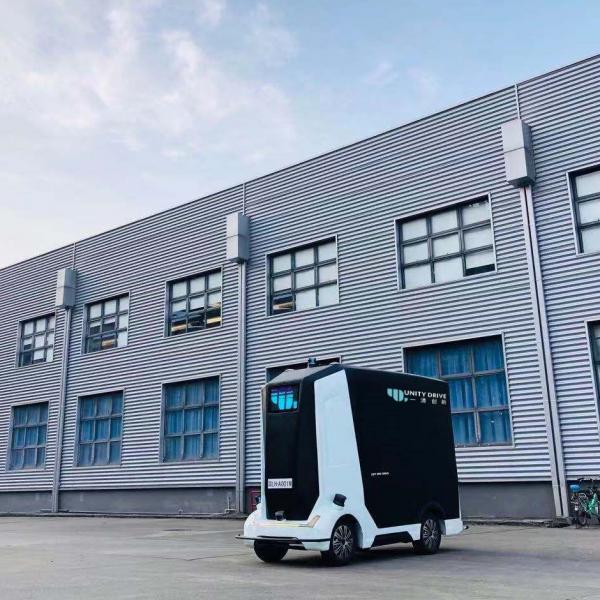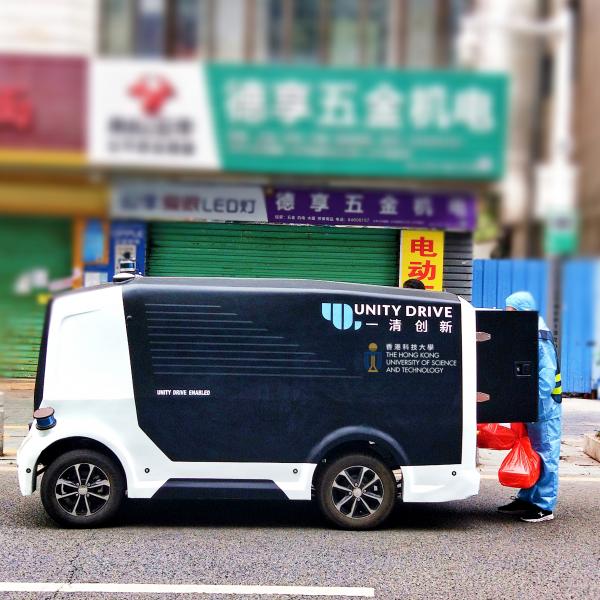Autonomous Vehicles Developed by HKUST Engineering Professor Serve the Community during COVID-19 Outbreak in Mainland China (只提供英文版本)
Since the 1980s, science fiction has spun visions of flying cars, autonomous vehicles and jetpack-powered human flight. However, it’s only in the past decade that breakthroughs in unmanned vehicles have made the possibility of such transport a reality. As the coronavirus spread through China, Professor LIU Ming, Assistant Professor of HKUST’s Department of Electronic and Computer Engineering and Department of Computer Science and Engineering, and Director of the Intelligent Autonomous Driving Center, had the immense satisfaction of seeing the autonomous vehicles developed at his start-up contribute to the effort to contain the spread of the disease.
As cities in central China went into lockdown to contain the coronavirus, the multifarious possibilities of artificial intelligence (AI) became apparent. With local administrations grappling with how to provide necessary services while facing both manpower shortages and the need to reduce people-to-people contact, the autonomous vehicles, developed by Professor Liu’s company Shenzhen Unity Drive Innovation Technology (UDI) had an opportunity to shine.
UDI provided two low-speed unmanned vehicles to Zibo, the city in Shandong province where Professor Liu was born, free of charge. The vehicles have been used to transport fresh fruit, vegetables and other supplies to severely affected areas since early February (view the YouTube video).
Each vehicle, carrying about 750 kg of supplies and driving at between 15-25km per hour, made deliveries four times a day. They also supplied groceries and vegetables to 16 nearby villages. Once goods were loaded into the vehicle, destinations were selected via a mobile app.
Later, UDI provided unmanned vehicles to Pingshan district in Shenzhen free of charge to distribute meals to the staff of a quarantined village there three times a day. The vehicles were also used to send materials to hospitals in Shenzhen, to spray disinfectant on streets and to broadcast messages to the community.
“When news of the coronavirus broke, we were confident that autonomous vehicles could play a positive role,” says Professor Liu, who felt a deep responsibility to serve the community at this critical juncture. “The central government has already endorsed unmanned technologies as part of its national strategy and local governments were willing to try to use the technology to help contain the epidemic.”
Gearing Up for Opportunities
In addition to providing a crucial service during the crisis, running the vehicles on public streets proved to be an invaluable experience for UDI.
“We gained priceless first-hand operating data and real-world experience,” says Professor Liu. “This means we have moved from the realm of possibility into reality. The last two months have given us an incredible boost of confidence.”
Moreover, the intense media coverage of the vehicles has raised public awareness of the benefits of autonomous vehicles and the myriad ways in which they could be used.
The company is in discussions with several well-known companies on developing solutions for them. “From an economic perspective, these vehicles offer quantifiable benefits,” Professor Liu says. “The most obvious one is that companies need not hire as many drivers.”
While the coronavirus epidemic has given the industry a fillip, the technology still has a long way to go. Borrowing examples from the telecommunications sector, Professor Liu says the autonomous vehicle industry is like a “Huawei”, which focuses on hardware, but lacks a “China Mobile” to provide a network through which it can operate.
“A single company cannot address the entire spectrum. We need many players and several success stories for the market to grow.”
Igniting a Passion for Robotics
Professor Liu’s interest in science, technology and engineering started early. “While STEM education is now all the rage in Hong Kong, I experienced it as a child,” he recalls. “Because my parents were teachers, I had access to various science and technology-related resources. After kindergarten, I went to the laboratories at the school they worked in, played with oscilloscopes or watched videos on anatomy. I was exposed to programming in primary school.” For fun, he assembled radios and airplane models.
In fact, from his first year at Tongji University, he didn’t need financial support from his parents as he helped companies on projects related to coding and electronic circuit design. “In Year 2, I was lucky to be chosen to participate in a project helping my university set up its School of Automotive Studies. That was when my association with vehicles formally began.”
However, it soon became apparent that AI was where the future lay. During his PhD at ETH Zurich, he focused on AI and its application in vehicles.
At HKUST, Professor Liu’s research focus has been deploying deep learning and deep reinforcement learning in mobile robotics, such as drones, unmanned vehicles or boats. His research group was one of the first in the world to implement deep reinforcement learning on real robots.
“I have received strong support from the University, as it attaches great importance to robotics and autonomous systems,” he says.
Powering Ahead
In 2018, Professor Liu founded UDI, a start-up that delivers intelligent products for the robotics, autonomous systems, smart logistics and transportation, high-end equipment manufacturing and information industries.
The company aims to provide unmanned vehicles for industrial use. The vision is to create a logistics version of the "RoboTaxi" system. “Just as we can hail a ride via Didi, specifying the pick-up and drop-off point, we want to develop a similar system for the transport of goods using unmanned vehicles. Of course, it’s challenging for this to be realized on public roads in the short term, given that fundamental issues, like policy support, have not been resolved.”
In addition to Shenzhen, the company has a production base for both manned and unmanned vehicles in Shandong province, supported by a nearly 1 billion-yuan investment from the local government. He says the company’s almost 100 employees based in Shenzhen are its core advantage.
Accelerating Towards a Goal
The milestone Professor Liu is proudest of is when UDI’s vehicle began operating at Foxconn’s industrial park. “It was a perfect test of all our previous work, from the vehicle’s body to the engine, hardware, software, algorithms and sensors.”
He vividly remembers spending a few months at the park. “It was normal for me to work until 3 to 4 am every day. We had many impromptu meetings, as there were often unforeseen situations that we had to resolve at once.”
Watching the vehicles move around the industrial park was the culmination of years of long preparation and the realization of his dream of creating a truly useful product. It has become the cornerstone of further research in the area.
Since then the vehicles have been tested in the Huawei and SF Express campuses too and have been trained to navigate complicated routes taking into account irregularly moving pedestrians, bicycles, motorcycles, private cars, trucks and trailers.
Professor Liu’s journey is a vindication of his faith in a proverb his parents taught him: “When a person is intent on his goal, the world offers him a way to achieve it". He also has a saying for dealing with frustration: "As long as your spirit remains strong, there will always be more solutions than difficulties."
Trusting in People
Professor Liu is keen to share his expertise more widely in the autonomous vehicle arena. “Our team created Hong Kong ’s first autonomous car in 2017. As a researcher, I hope to assist in government policy studies, to help set up an industry alliance and to collaborate with the Hong Kong Science Park on testing.”
Geographically, Professor Liu endorses the Greater Bay Area (GBA) as one of the best manufacturing bases in the country, given its rich talent pool and relatively strong industrial foundation. “Catalyzed by supportive national policies, the area will develop rapidly and provide abundant opportunities for robotics, AI and big data.”
The establishment of The Hong Kong University of Science and Technology (Guangzhou) exemplifies the collaboration between Hong Kong and other cities in the GBA and beyond on cross-disciplinary education, research and commercialization, while strengthening knowledge transfer to bridge Hong Kong’s gap in high-tech manufacturing.
Strongly believing that people are the linchpin of technological breakthroughs, Professor Liu says it is critical to establish an appropriate training mechanism, to nurture more talent from engineering to project management.
“No matter how advanced AI becomes, people are crucial. Although AI seems to have triumphed over human beings in some areas, like chess or facial recognition, those are victories of data, not intelligence. The true capacity of human beings has not been surpassed by AI.”
Asked about the impact of autonomous vehicles on society if they become commonplace in the future, he says, this is a question all of science and technology must face. “The quest for greater efficiency will inevitably bring social change. When the automobile – an iron case weighing about 2 tones and moving at about 60 km – first appeared on streets crowded with pedestrians and horse-drawn carriages in the late 19th century, people feared they would be dangerous. Similarly, autonomous vehicles will reduce costs and improve efficiency, but will no doubt change human lives.”
Relevant Links:
- More demo videos by UDI on YouTube
- Robotics and Multi-Perception Lab, HKUST Robotics Institute (RAM-LAB)




